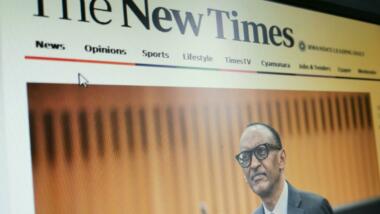The overwhelming majority of advertising we see on the web is bought and sold through online marketplaces in real time. The world’s largest provider is Google – advertising is the search engine company’s core business. Google’s market power has come to the attention of the EU authorities, and the Commission wants to regulate the advertising market more strictly in its upcoming Digital Services Act and Digital Markets Act.
But why does Google dominate the online ad market in the first place? A recently published paper by Dina Srinivasan deals with this question. Srinivasan worked for WPP, the world’s largest advertising company, before moving to research on tech and antitrust as a fellow at Yale University’s Thurman Arnold Project. In a previous study, she showed why Facebook’s poor data protection could be an unfair competitive advantage.
Srinivasan’s new paper raises the question of why real-time advertising markets are not subject to similarly strict rules as financial markets. In its advertising network, Google is often both an intermediary and a seller, and conflicts of interest are inevitable. Srinivasan spoke with netzpolitik.org about what political conclusions we should draw from the situation in the online advertising market.
netzpolitik.org: In your paper, you talk about how Google came to dominate online advertising. Google was late to enter the programmatic advertising market in 2009, but managed to outflank older competitors. Why do you compare the situation on online advertising exchanges, where Google has become dominant, to that on financial markets?
Srinivasan: In advertising markets, like in financial markets, buyers and sellers can’t just go directly to the exchange and say: „Hey, I want to sell this, I want to buy this.“ Sellers such as news publishers have to go through a middleman in order to sell on exchanges. Buyers who are advertisers also have to go through a middleman or an intermediary to buy on exchanges. What Google did to rapidly grow its exchange from a dead start to number one, is it acquired the number one broker on the sell side. DoubleClick had about 50 percent of the market when Google purchased it in 2008. And at the time, DoubleClick was a neutral broker for publishers. It routed inventory to marketplaces in a neutral manner. What Google did is it purchased DoubleClick and then started routing order flow or liquidity to its own exchange, AdX, which it had just launched in late 2009. Yahoo exchange had been founded about five years earlier and was already processing nine billion advertising impressions each day. So you have to think, how does Google launch an exchange and go from nowhere to number one in the market? One of the most fascinating things that I found in my research is that you see that this is not anything that’s novel. New financial brokers cannot engage in the same kind of conduct to grow their own exchange. At least in the US, we have rules against this precisely because it leads to these kinds of market problems.
netzpolitik.org: Google is offering its search and other services such as Youtube to advertisers – the company has basically built an entire display ecosystem for ads. Can online ad exchanges really be compared to electronic markets in other sectors?
Srinivasan: Stock exchanges have migrated to become electronic exchanges only in the last 15 years. We can also think of many other examples of the economy that have migrated to electronic trading, for example, airfare tickets. Event tickets, opera tickets, sports tickets are also bought and sold in ticket marketplaces. Cryptocurrencies are now bought and sold on electronic cryptocurrency exchanges. We have different segments of the economy that are migrating to trading electronically on centralized exchanges.
Advertising is just another sector that has migrated to electronic trading on centralized exchanges. Over in the US now, over eighty five percent of display advertising is been sold on these new electronic exchanges. It’s similar to financial markets because, A: you have a part of the economy that’s migrating to trading on centralized exchanges, but B: because buyers and sellers also have to go through middlemen to trade. That’s not always the case, but in advertising that structure is very similar to financial markets. And it just goes back again to the structure of the market being set up where buyers and sellers cannot trade on the exchange directly. They have to go through a broker, a middleman to do so.
People, when they think of Google, often just think that Google runs a search engine. If you understand that Google makes almost all of its money from advertising, the next assumption is that, oh, that’s because Google sells lots of ads on YouTube and lots of ads on search. And that’s true. But the next thing to really understand is that Google just doesn’t just sell ad space on its own properties. It also sells the inventory on behalf of millions of other properties around the world and…
netzpolitik.org: Including newspapers.
Srinivasan: Yeah. The biggest newspapers pretty much in every country across the world. Google is selling their inventory on its exchange.
In financial markets one of the critical problems that comes up is when you go to a broker and say: „Oh, I want to buy some stock”, but the broker has a financial interest in a company and steers your trading to that particular stock. Brokers have to manage their conflicts of interest. In advertising, by looking at Google’s revenues over the course of the last 15 years, we can observe one very simple trend, which is that every year the proportion of trades that are allocated to Google properties is growing larger and larger, and the proportion of trades that are allocated to that over two million other properties is growing smaller and smaller and smaller.
There are various reasons that this happens. But there is steering and allocation happening at the Google broker level. One example that I give in my paper, which is very overt, is when I signed up for a new Google ads account. Google actually required me to start spending money on Google Search before I could even bid on the ad space belonging to news publishers. So there are all kinds of ways that you can have steering and allocation problems. That’s one particular example.
netzpolitik.org: Another one is that, according to a report by NiemanLab, Google is now blocking the ads publishers sell if they don’t meet Google’s standards.
When I read your paper I was struck by how obvious your argument about conflicts of interest on the ad market sound today. When Google bought DoubleClick in 2009, how could regulators overlook that?
Srinivasan: Part of the problem is that competition authorities analysed the Google merger as something new and novel. When you draw the analogy between the structure of advertising and the structure of financially traded instruments and you take that story to people that work in government, in the financial industry, they’re like, “what were the competition authorities thinking?” If we had a financial broker that came to us and said: „Hey, we want to run an exchange and we want to run a broker at the same time“, there’s no entertaining that this would be a good thing.
When they tell us, “don’t worry, we’re not going to trade on inside information”, there should be zero trust given to any kind of promises. In financial markets, we have proactive firewall requirements. Brokers can’t talk to exchange people. They have to be in different buildings. They have to make sure that they are not breaching conflicts of interest. When I talk to people on the on the financial side and financial markets, it all seems incredibly obvious to them.
netzpolitik.org: I wanted to talk about the role of publishers in the online advertising ecosystem. Our recently published study looks at Google’s cash gifts to publishers in Europe. Our findings confirmed a broad trend that publishers in Europe and the US seek margins away from online advertising because online advertising doesn’t pay off for publishers. Figures you cite highlight that according to the last available figures for the first quarter of 2020, only 15 percent of advertising spending on Google’s ad network goes to non-Google properties. Is there something we can do about that?
Srinivasan: Look, after the Great Depression, we realize that the markets were essentially rigged and we decided to pass laws to try to solve that problem. I think the problem here is that advertising markets are rigged. Google’s answer is, “don’t worry, I’ll give you presents”. But we just need the market to not be rigged. As a general matter, we should agree that No.1: Conflicts of interests need to be managed. You need to have transparency to make sure people are not cheating.
netzpolitik.org: The European Commission will unveil its Digital Services Act and Digital Markets Act this week. It will likely contain new competition policy instruments that could help to address some of these issues.
But some people are suggesting that the problem is personalized advertising in the first place and we should revert to contextual advertising. In your paper you note that without access to user data, the demand for ad space wanes and clearing prices on exchanges drop dramatically. What is your take on outlawing personalized advertising? Is that even feasible?
Srinivasan: We can have rules around what data is transferred. We can prohibit certain types of targeting. But why not also just let consumers that don’t like it opt out and switch to contextual entirely, just give them a kill switch. Let the market operate, let any consumer that doesn’t like the market opt out. And I mean, at the end of the day, I think that we help markets. Operate efficiently by increasing consumer choice. It would be very good to give consumers the option to opt out and the same way that we allowed consumers to stop receiving phone calls at dinner at home. And by the way, I’m not sure in Europe, did you guys pose any kind of legislation against automated telephone calls at home?
netzpolitik.org: I’ve never really had one in my life. I’m not sure that is allowed here.
Srinivasan: In the US, in the early 2000s, we passed national legislation that created the Do Not Call list. We made one national registry and citizens could input their name and phone number on it. We have debates today about whether we should allow consumers to opt out of targeted advertising. Should we be more paternalistic and have consumers opt out by default? Back then we didn’t stop robo-calls entirely, we forced consumers to signal that they wanted to opt out. Something like 85 percent of the entire population opted out within a few years. It killed the entire industry overnight. That was an incredibly effective way for consumers to signal their choice in the market.





0 Ergänzungen
Dieser Artikel ist älter als ein Jahr, daher sind die Ergänzungen geschlossen.